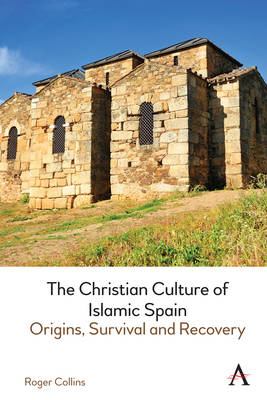
- Retrait gratuit dans votre magasin Club
- 7.000.000 titres dans notre catalogue
- Payer en toute sécurité
- Toujours un magasin près de chez vous
- Retrait gratuit dans votre magasin Club
- 7.000.0000 titres dans notre catalogue
- Payer en toute sécurité
- Toujours un magasin près de chez vous
The Christian Culture of Islamic Spain
Origins, Survival and Recovery
Roger CollinsDescription
To define the culture of the Christian communities of early Islamic Spain, it is vital to study its origins in the
Visigothic kingdom that controlled the Iberian Peninsula between the fifth and eighth centuries, and under which it developed its distinctive form. Next, we can see how, following the Arab conquest of 711, Christianity in al-Andalus became open to new influences from the eastern Mediterranean. In consequence, it began to diverge from the forms it took elsewhere in the early medieval West, even in comparison with the small Christian states that emerged in northern Spain in the eighth and ninth centuries. In reconstructing the character and resilience of Andalusi Christianity, recent textual and archaeological research plays a crucial part, and further indications can be drawn from its cultural imprint on the frontier areas of the northern states. Religious and secular communities migrated into these regions as the result of widespread upheavals in al-Andalus in both the late ninth/early tenth and late tenth/early eleventh centuries, bringing with them artistic and other cultural traditions that are clearly documented in surviving buildings and manuscripts, even when combined with local traditions.
While these migrations were the start of the process that ultimately resulted in the final disappearance of Christians from al-Andalus in the twelfth century, when the last communities were deported to North Africa, another significant body of them survived in the city of Toledo, thanks to its conquest by the kingdom of Castile in 1086. This was the Mozarabic, or 'Arabised', Christian community of the city, whose descendants and ecclesiastical parishes it still contains, together with a corpus of manuscripts that confirm the tenacity of Visigothic Christianity. The survival of these books and the churches that used them across the remainder of the Middle Ages made possible a renewal of interest at the very end of the fifteenth century, and the start of the modern tradition of scholarly enquiry into them and into the surviving elements of Andalusi Christianity more generally. The Christian Culture of Islamic Spain examines both this phase of the rediscovery of the Andalusi Christian past and then the way this has been used in political and cultural arguments right up to the present about the nature of the Spanish identity and the way in which the Arab conquest and the subsequent seven centuries of Islamic rule in parts of the peninsula should be interpreted.
Spécifications
Parties prenantes
- Auteur(s) :
- Editeur:
Contenu
- Nombre de pages :
- 250
- Langue:
- Anglais
Caractéristiques
- EAN:
- 9781785279218
- Date de parution :
- 03-03-26
- Format:
- Livre relié
- Format numérique:
- Genaaid
- Dimensions :
- 153 mm x 229 mm
- Poids :
- 453 g

Les avis
Nous publions uniquement les avis qui respectent les conditions requises. Consultez nos conditions pour les avis.






